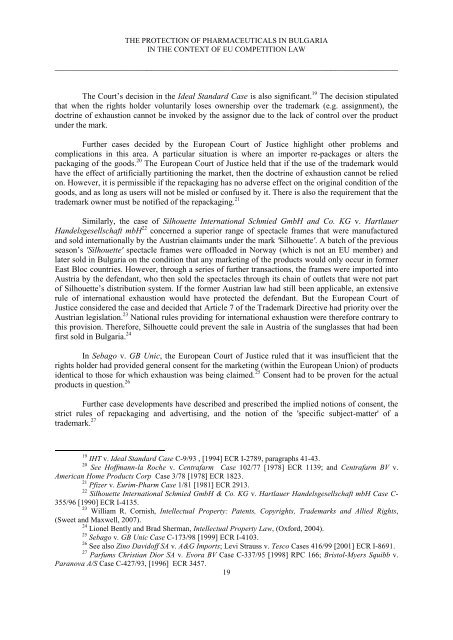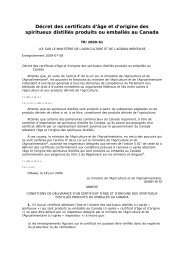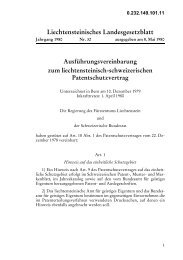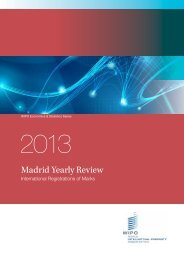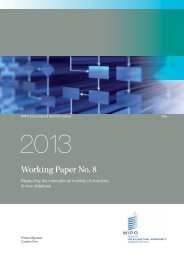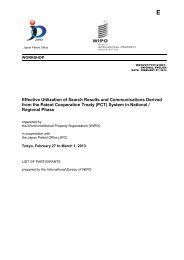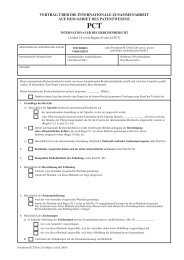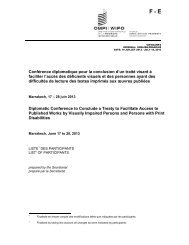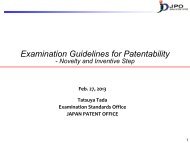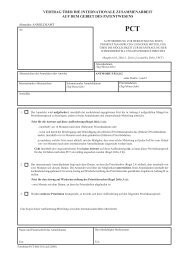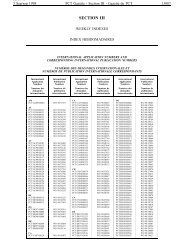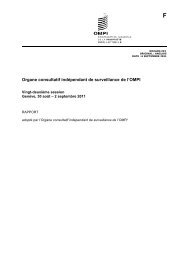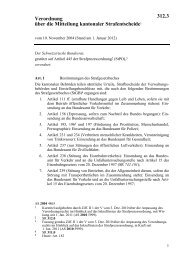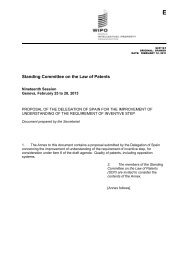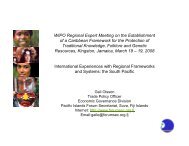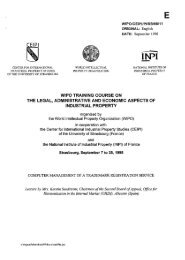WIPO-WTO COLLOQUIUM PAPERS
WIPO-WTO COLLOQUIUM PAPERS
WIPO-WTO COLLOQUIUM PAPERS
You also want an ePaper? Increase the reach of your titles
YUMPU automatically turns print PDFs into web optimized ePapers that Google loves.
THE PROTECTION OF PHARMACEUTICALS IN BULGARIA<br />
IN THE CONTEXT OF EU COMPETITION LAW<br />
__________________________________________________________________________________<br />
The Court‟s decision in the Ideal Standard Case is also significant. 19 The decision stipulated<br />
that when the rights holder voluntarily loses ownership over the trademark (e.g. assignment), the<br />
doctrine of exhaustion cannot be invoked by the assignor due to the lack of control over the product<br />
under the mark.<br />
Further cases decided by the European Court of Justice highlight other problems and<br />
complications in this area. A particular situation is where an importer re-packages or alters the<br />
packaging of the goods. 20 The European Court of Justice held that if the use of the trademark would<br />
have the effect of artificially partitioning the market, then the doctrine of exhaustion cannot be relied<br />
on. However, it is permissible if the repackaging has no adverse effect on the original condition of the<br />
goods, and as long as users will not be misled or confused by it. There is also the requirement that the<br />
trademark owner must be notified of the repackaging. 21<br />
Similarly, the case of Silhouette International Schmied GmbH and Co. KG v. Hartlauer<br />
Handelsgesellschaft mbH 22 concerned a superior range of spectacle frames that were manufactured<br />
and sold internationally by the Austrian claimants under the mark 'Silhouette'. A batch of the previous<br />
season‟s 'Silhouette' spectacle frames were offloaded in Norway (which is not an EU member) and<br />
later sold in Bulgaria on the condition that any marketing of the products would only occur in former<br />
East Bloc countries. However, through a series of further transactions, the frames were imported into<br />
Austria by the defendant, who then sold the spectacles through its chain of outlets that were not part<br />
of Silhouette‟s distribution system. If the former Austrian law had still been applicable, an extensive<br />
rule of international exhaustion would have protected the defendant. But the European Court of<br />
Justice considered the case and decided that Article 7 of the Trademark Directive had priority over the<br />
Austrian legislation. 23 National rules providing for international exhaustion were therefore contrary to<br />
this provision. Therefore, Silhouette could prevent the sale in Austria of the sunglasses that had been<br />
first sold in Bulgaria. 24<br />
In Sebago v. GB Unic, the European Court of Justice ruled that it was insufficient that the<br />
rights holder had provided general consent for the marketing (within the European Union) of products<br />
identical to those for which exhaustion was being claimed. 25 Consent had to be proven for the actual<br />
products in question. 26<br />
Further case developments have described and prescribed the implied notions of consent, the<br />
strict rules of repackaging and advertising, and the notion of the 'specific subject-matter' of a<br />
trademark. 27<br />
19 IHT v. Ideal Standard Case C-9/93 , [1994] ECR I-2789, paragraphs 41-43.<br />
20 See Hoffmann-la Roche v. Centrafarm Case 102/77 [1978] ECR 1139; and Centrafarm BV v.<br />
American Home Products Corp Case 3/78 [1978] ECR 1823.<br />
21 Pfizer v. Eurim-Pharm Case 1/81 [1981] ECR 2913.<br />
22 Silhouette International Schmied GmbH & Co. KG v. Hartlauer Handelsgesellschaft mbH Case C-<br />
355/96 [1990] ECR I-4135.<br />
23 William R. Cornish, Intellectual Property: Patents, Copyrights, Trademarks and Allied Rights,<br />
(Sweet and Maxwell, 2007).<br />
24 Lionel Bently and Brad Sherman, Intellectual Property Law, (Oxford, 2004).<br />
25 Sebago v. GB Unic Case C-173/98 [1999] ECR I-4103.<br />
26 See also Zino Davidoff SA v. A&G Imports; Levi Strauss v. Tesco Cases 416/99 [2001] ECR I-8691.<br />
27 Parfums Christian Dior SA v. Evora BV Case C-337/95 [1998] RPC 166; Bristol-Myers Squibb v.<br />
Paranova A/S Case C-427/93, [1996] ECR 3457.<br />
19


